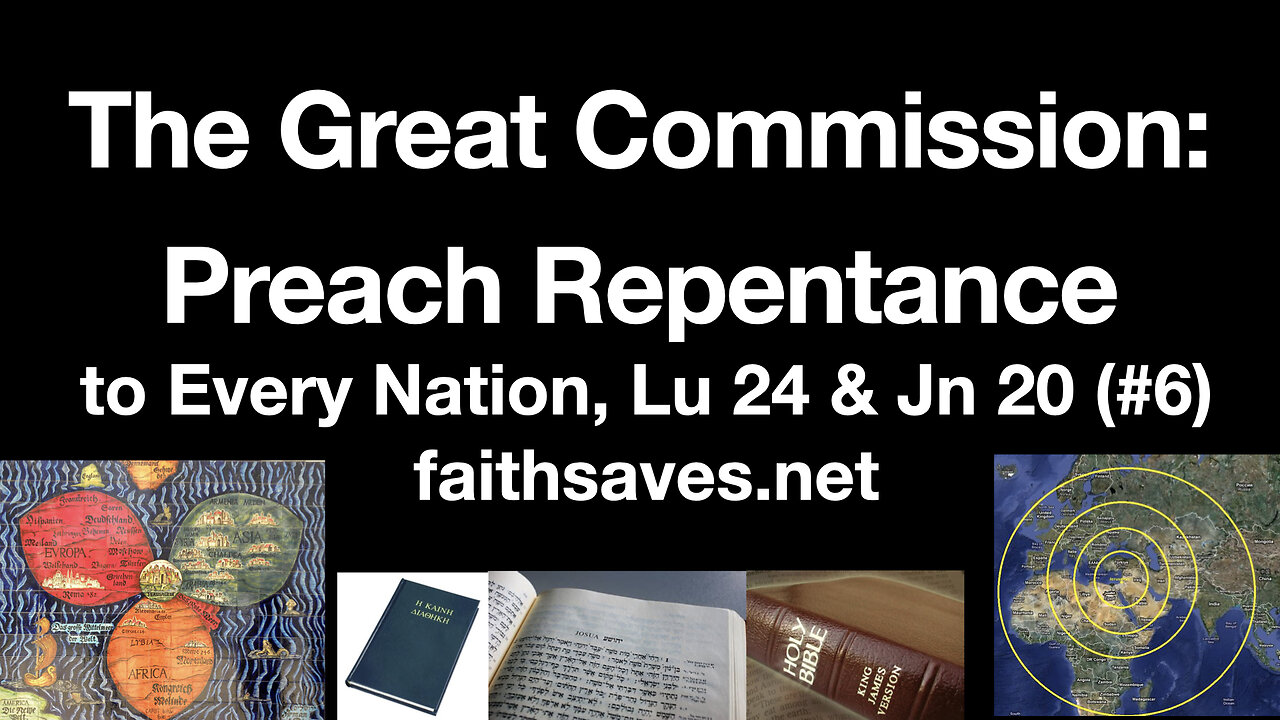Premium Only Content

The Great Commission: Preach Repentance and Remission of Sins to All Nations, Luke 24 & John 20 (#6)
"The Great Commission: Preach Repentance to Every Nation, Mark 16, Luke 24, John 20" is part 3 of a 3 part series on the Great Commission passages (Matthew 28; Mark 16; Luke 24; John 20). Much of the material is found in the study "The Great Commission in Scripture and History" at the FaithSaves website.
The gospel of Luke records another restatement of the Great Commission by the risen Lord Jesus:
44 And he said unto them, These are the words which I spake unto you, while I was yet with you, that all things must be fulfilled, which were written in the law of Moses, and in the prophets, and in the psalms, concerning me. 45 Then opened he their understanding, that they might understand the scriptures, 46 And said unto them, Thus it is written, and thus it behoved Christ to suffer, and to rise from the dead the third day: 47 And that repentance and remission of sins should be preached in his name among all nations, beginning at Jerusalem. 48 And ye are witnesses of these things. 49 And, behold, I send the promise of my Father upon you: but tarry ye in the city of Jerusalem, until ye be endued with power from on high. (Luke 24:44-49)
The record of the Great Commission in the gospel of John also emphasizes the tremendous responsibility and privilege of the church in preaching the gospel:
19 Then the same day at evening, being the first day of the week, when the doors were shut where the disciples were assembled for fear of the Jews, came Jesus and stood in the midst, and saith unto them, Peace be unto you. 20 And when he had so said, he shewed unto them his hands and his side. Then were the disciples glad, when they saw the Lord. 21 Then said Jesus to them again, Peace be unto you: as my Father hath sent me, even so send I you. 22 And when he had said this, he breathed on them, and saith unto them, Receive ye the Holy Ghost: 23 Whose soever sins ye remit, they are remitted unto them; and whose soever sins ye retain, they are retained. (John 20:19-23)
As in the gospels of Matthew and Mark, Christ gives the Great Commission as recorded in Luke’s gospel to the church. The individual believers present in that day would not get to “all nations” (Luke 24:47) to give the glad tidings, but the church, guaranteed perpetuity by Christ, could not only reach them but continue to preach repentance to them until the end of the age.
The “ye” who will be “endued with power from on high” in v. 49 when the Father sends His “promise” represents the church of Acts one and two, which Christ, in fulfillment of His promises to send the Comforter (John 14-16), baptized with the Spirit (Acts 1:5), and so set forth as His new institution, replacing the Jerusalem temple, which (as with the tabernacle, and with the future Millennial temple) had received similar miraculous recognition as His place of public worship and service (Exodus 40:34-35, 1 Kings 8:11, Matthew 21:43; cf. Ezekiel 10:18, 43:4-5, 44:4, 48:35, Revelation 21:11, 22-23). When Christ sent the Spirit, the ones who “were all with one accord in one place” (Acts 2:1) were “filled with the Holy Ghost” (Acts 2:4) and, having received power (Acts 1:8), proceeded to preach repentance and remission of sins (Acts 2:38) as Christ had ordained (Luke 24:47, 49), “beginning at Jerusalem,” and were used by the Lord to produce tremendous conviction and many conversions. The church, clearly already alive and functioning before Pentecost in Acts chapter one, where it held a business meeting to appoint the successor of Judas (Acts 1:15, 23, 26), having now been baptized in the Spirit, had three thousand souls added to her previous membership of at least one hundred and twenty (Acts 2:1, 41). The longevity required to reach “all nations,” the explicit assembly context of Luke 24:47, and the demands of 24:49 all demonstrate that Christ delivered the Great Commission in Luke’s gospel to the church.
Christ tells His church in Luke 24:48 that her members “are witnesses of these things.” The KJV word “witness,” martus, meant in Classical Greek “a witness,” and was related to the verb martureo, “to be a witness ... to bear witness to a thing, testify to.” Christ calls every church member to be a witness for Him. In Luke 24:48, every saint present was a martus—the Lord said “ye [2nd person plural] are witnesses.” While the Commission here, as elsewhere, is given to the church, the command “ye shall be witnesses” demonstrates individual responsibility in reaching the local area, “Jerusalem,” nearby regions, “all Judaea, and in Samaria,” and the farthest regions, “unto the uttermost part of the earth” (Acts 1:8). The church member who fails to witness as commanded in Scripture commits despicable iniquity, violates the trust of the Great Commission, and is guilty of the blood of those who go to Hell because of his rebellion and wickedness (Acts 20:26, Ezekiel 3:18-21; 33:1-9). If the church goes and people believe, their sins are remitted; otherwise they are retained (John 20:19-23).
-
 LIVE
LIVE
Discover Crypto
1 hour agoBitcoin GOLD RUSH 2025: THIS State Going ALL IN!
256 watching -
 LIVE
LIVE
Rethinking the Dollar
18 minutes agoThe Damage Is Unrepairable: It's To Late To Go Back NOW! | Morning Check-In
60 watching -
 LIVE
LIVE
Bannons War Room
2 months agoWarRoom Live
18,442 watching -
 1:13:13
1:13:13
Dear America
15 hours agoTrump’s Top Accomplishments That Will SILENCE The Left + Dem Rep. Introduces Impeachment Articles!
60K21 -
![🔴[LIVE TRADING] Trump Admin Discusses New Trade Deals || The MK Show](https://1a-1791.com/video/fww1/4d/s8/1/Z/T/9/F/ZT9Fy.0kob-small-The-MK-Show-Apr.-29th.jpg) LIVE
LIVE
Matt Kohrs
8 hours ago🔴[LIVE TRADING] Trump Admin Discusses New Trade Deals || The MK Show
1,108 watching -
 LIVE
LIVE
Wendy Bell Radio
6 hours agoEven the Left Knows It's Too Far Left
8,988 watching -
 LIVE
LIVE
NEWSMAX
2 hours agoThe Gerry Callahan Show LIVE (04/29/2025) | NEWSMAX Podcasts
504 watching -
 43:19
43:19
Randi Hipper
1 hour agoBLACKROCK BUYS NEARLY $1 BILLION WORTH OF BITCOIN
7.66K -

2 MIKES LIVE
2 hours agoTHE MIKE SCHWARTZ SHOW with DR. MICHAEL J SCHWARTZ 04-29-2025
9.11K1 -
 57:06
57:06
BEK TV
11 hours agoExposing the Left’s Agenda: Border Chaos, Gun Control, and 2028 Predictions - Nick Adams
6.36K